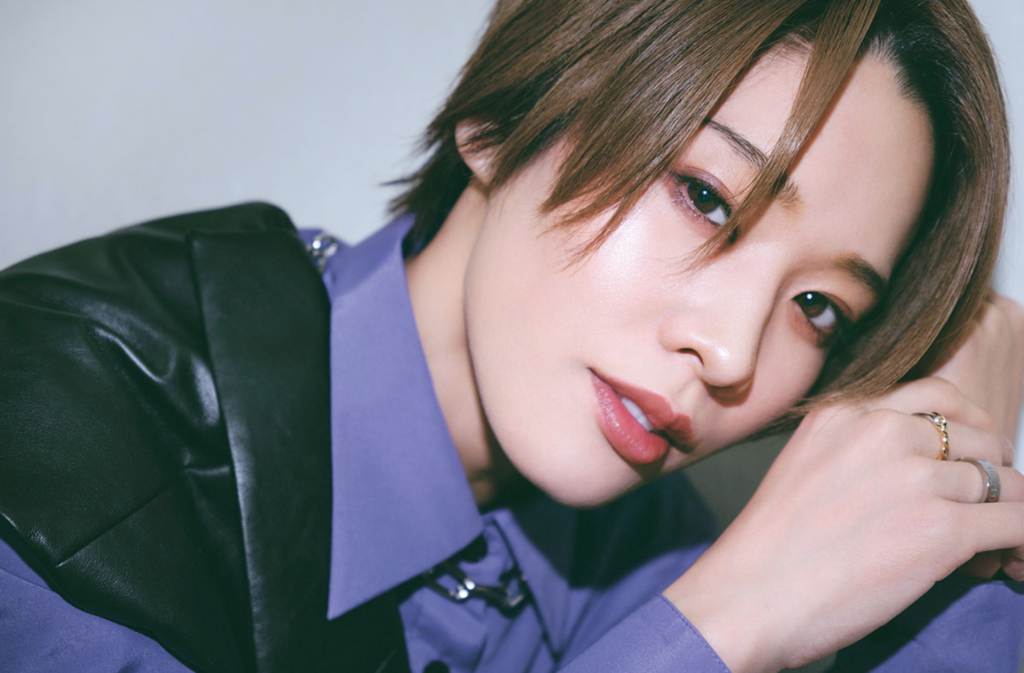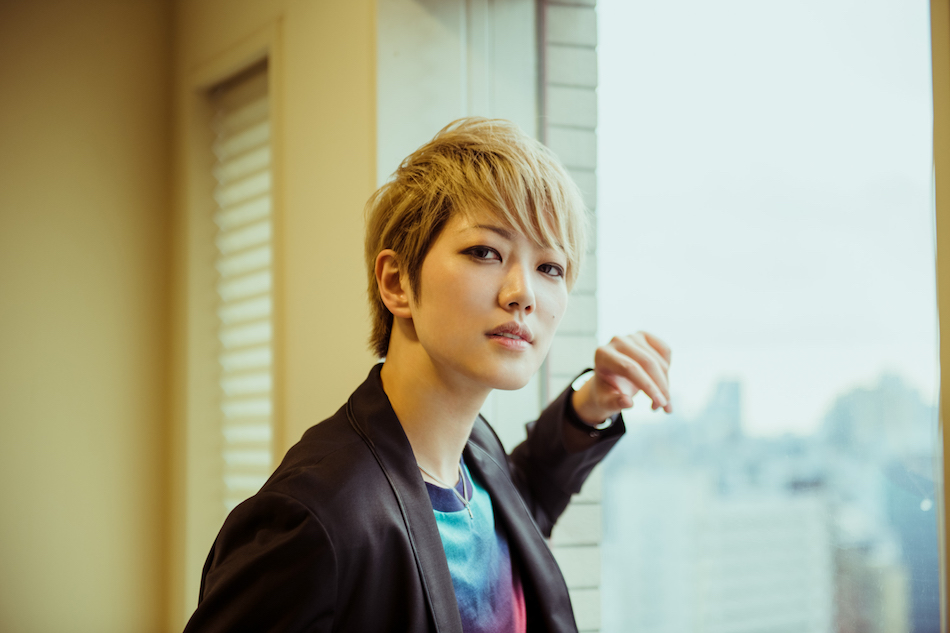
They’re them, and I’m me. What matters is walking your own path with your own two feet.
Kazuki Sora
I want to keep improving myself, so I don’t show my weak side to anyone.
Kazuki Sora
“The only people I played with as a child were my two older brothers and their friends. Growing up surrounded by boys made me a tomboy; cuts and bruises couldn’t stop me, and I absolutely hated losing. The second someone started running, I’d yell ‘LET’S RACE!!’ and arbitrarily turn it into a contest. I was that kind of competitive kid (lol).”
Kazuki’s parents raised their tomboy daughter in a carefree manner. Looking back, she doesn’t recall ever being told don’t do this, don’t do that; rather, she says, “If I said I want to do something or other, and they’d put me into all kinds of lessons, and allow me to be guided by my curiosity.”
“I’m a very curious person, but I also lose interest in things quickly. I’m a classic type-B*, I start learning something and quickly give it up. The only thing I never gave up on was dance.”
Dance would go on to change Kazuki’s life dramatically. She had an interest in the world from which her dance teacher—a former Takarasienne—came, and she left her first Takarazuka performance thinking, “I want to stand on that stage!!”
“My parents didn’t push back then either. I didn’t appreciate this as a child, but now as an adult there is something I’ve realized: thinking for myself and acting accordingly, learning from the obstacles I face, and choosing my own path forward is something my parent’s taught me, I think.”
Although Kazuki had overcome countless obstacles by relying on her all-in, hate-to-lose spirit, she experienced a plethora of failures after entering Takarazuka. No matter how much effort she put in, she never seemed to reach her goals, causing her immense bitterness and frustration, she says.
“In those times, the words that gave me strength were, ‘they’re them, and I’m me.’ You really can’t help but feel affected by the opinions and value judgments of those around you, but really the only thing that matters is the stage in front of you. You have to just put in the work, without thinking too much, without letting the voices around you lead you astray. I came to think that in times of frustration, the best thing to do is carry yourself with an undeniable raw power.”
In the musical Anastasia, Kazuki’s character, Lily, speaks a line that has likewise become some of Kazuki’s words to live by: “Life is meant to be enjoyed.” You only get one chance at life, and there’s no time to be standing around. In that spirit, Kazuki feels, “There is a path in life that is yours and yours alone, and you have to walk it with your own two feet, with as little regret as possible.”
“Fundamentally, I’m someone who wants to keep moving forward. For that reason, I choose not to worry about things that are not in my power, and not to think about things I can’t change. It’s better to shed as much of your baggage as possible (lol).”
Kazuki always seems to carry herself with a certain fortitude, brightness, and positivity. When asked if she ever experiences negative emotions, her response was, “Of course, that’s inevitable… but again, fundamentally, I’m the type of person who doesn’t want to show weakness.”
“I’m uncomfortable crying in front of people, complaining, and bringing my worries to others. I know that maybe a part of me would some relief from letting my weaker side show, but I really don’t want to do that. I want to be someone who can stand up straight and not allow others to sense when I’m struggling. That can be really hard to do, but I feel that I want to be stronger, I have to be stronger, and those feelings go a long way in supporting me. I’m satisfied with only showing my weaknesses to the few close friends I really trust. Who, by the way, tell me I cry like a puppy caught in the rain (lol).”
3 questions for Kazuki Sora
Q1: What kind of person is Kazuki Sora?
A1: Kazuki Sora is someone who seems easy to understand, but in reality is shrouded in mystery (lol)
“I come off as a passionate and energetic person who hates to lose, can be a bit shy, is always positive, and has immense curiosity about a lot of things, but in reality I’m unexpectedly low-key… I also have kind of a black and white personality, where I’m really into the things I’m into, but have absolutely no interest in the things I’m not into. For example, my home often ends up in a state where this one area will be totally perfected, and the rest is just whatever (lol). I also heat up and cool off quickly, so to speak, like I’ll get totally engrossed in something one minute and the next minute feel totally indifferent about it. During these types of interviews, we almost always get asked what we’re into lately, but what usually happens is that by the time the article is published I’m into something totally different (lol).
I have the same sense of extremity in my personal relationships. With the few friends I want to really know me, I won’t conceal any part of myself, but with anyone else it’s like, ‘No access beyond this point,’ and I have secretive tendencies. When the underclassmen ask me things about my private life, even just like ‘how did you spend the off day’ or ‘ what did you do yesterday,’ I’ll always say something standard like, ‘Ah, I did something I can’t really talk about,’ and I just won’t tell them, or I’ll flip it into some kind of joke (lol). As a result, people tell me that I seem really easy to understand, but they don’t actually know anything about me. That seems to be the number one impression that those around me have (lol).”
Q2: This is your 14th year as an otokoyaku. What does this era feel like to you?
A2: I’m enjoying more freedom in just acting
“In our last revue, Jewel de Paris, there is one scene where I was asked to play a female role, something I’ve done a few times before as well. Whenever it happens, I’m always asked, ‘Do you feel any resistance to that?’ But my answer is always ‘not in the slightest.’ Naturally, there are differences in how you express the character, but in terms of ‘playing a role,’ the concept of ‘this is how you play a male role’ vs ‘this is how you play a female role’ doesn’t exist for me, so to speak… nothing changes about my approach.
There have been times when I’ve felt like I want to be this type of otokoyaku or that type of otokoyaku, and I’ve chased after a sort of ideal, and then with onnayaku experiences added on top of that, I feel like I’ve been able to arrive at a place where rather than restricting myself to being some way or another, I can simply focus on ‘acting.’ Now in my 14th year, I can feel myself becoming more free on stage.”
Q3: What type of person do you most admire?
A3: People who are like, “This is me,” and forge their own path with conviction, are beautiful to me
“I only have three friends whom I trust deeply enough to show the real me. What all three of them have in common is they are people I can respect, and who possess a strong sense of self. Because of that, I feel like I truly want to hear what they have to say, and I want them to hear what I have to say… I want the people I’m close with to tell me the bitter truth.
As you rise in the ranks in Takarazuka, fewer and fewer people will critique you harshly, and that makes me want have people I trust whom I can go to for their brutal honestly. When I feel like they’re not giving it to me, I’ll force the criticism out of them (lol). I don’t need anyone to flatter me or tiptoe around my feelings; the more people feel like they can be blunt with me, the more I grow to like them.
Typically, the people I feel admiration for are the ones who possess a true sense of self. People who forge their own path, without following those around them, no matter what anyone else says, mo matter what others think of them. When I see someone who pours all their strength into the things they feel they should do, who doesn’t allow themselves to be satisfied with the status quo, who is continually putting in effort and taking on challenges, I feel like, “that’s a beautiful person.”
*TN: This refers to blood type B, and the personality traits believed to be associated with that in Japanese culture.


